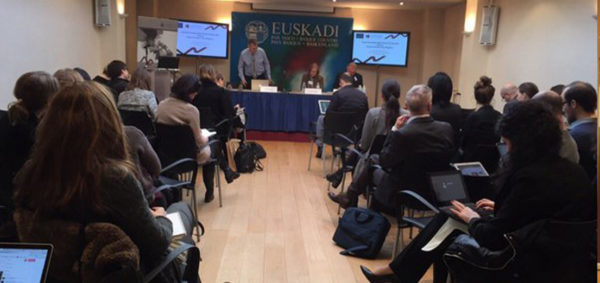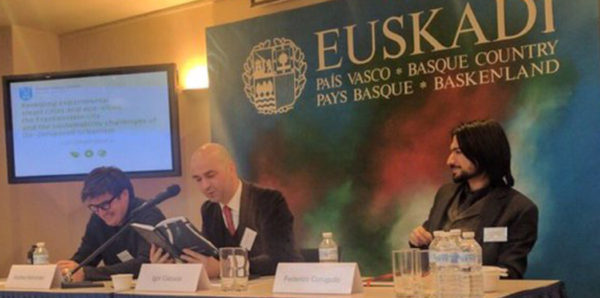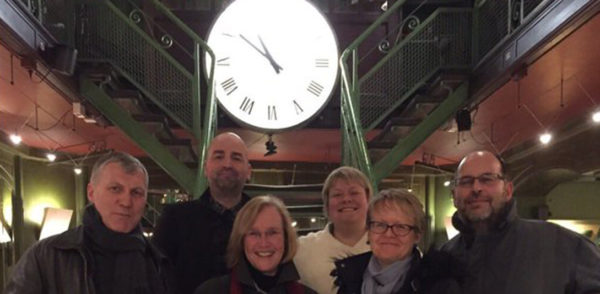European Urban Living Labs as experimental city-to-city learning platforms
Professor Michael Keith and Dr Igor Calzada, MBA
On 13 February 2017, the Urban Transformations programme, funded by the Economic and Social Research Council (ESRC), brought together a range of academics and practitioners from across Europe for a knowledge exchange event on urban living labs and smart cities. The University of Oxford convened the event, working with the European Regions Research and Innovation Network (ERRIN), a platform that connects academics and practitioners in diverse research fields within the European regions, and the workshop took place at one of ERRIN’s members, the Delegation of the Basque Country to the EU. This was the second in a series entitled Bridging European Urban Transformations established in partnership with the VUB (Vrije Universiteit Brussel) and its Brussels Centre for Urban Studies. In this post-Brexit era, cooperation across borders and disciplines seems more important than ever before. Consequently the series, which runs from November 2016 to October 2017, emphasises the value of connections between institutions and key players in the field of urban transformations in the UK and in the rest of Europe.
 The workshop Experimenting Urban Living Labs (ULLs) Beyond Smart City-Regions explored potential transitions, feasible pathways, and missing links between the smart cities paradigm and the experimental urban living lab approach. Despite the underlying critical discussion from academia regarding the technocratic discourse derived from the smart city mainstream policy agenda, the workshop facilitated not only a critical but also a constructive collective joint reflection by European academics and regional policy-makers examining the potential of the ‘lab’ concept. The workshop considered how the ‘living lab’ approach might nuance technocratic framings of the ‘smart city’ and open up more democratic and open systems of making cities.
The workshop Experimenting Urban Living Labs (ULLs) Beyond Smart City-Regions explored potential transitions, feasible pathways, and missing links between the smart cities paradigm and the experimental urban living lab approach. Despite the underlying critical discussion from academia regarding the technocratic discourse derived from the smart city mainstream policy agenda, the workshop facilitated not only a critical but also a constructive collective joint reflection by European academics and regional policy-makers examining the potential of the ‘lab’ concept. The workshop considered how the ‘living lab’ approach might nuance technocratic framings of the ‘smart city’ and open up more democratic and open systems of making cities.
In this sense, how we make the future visible might be as significant as the ways in which we make the future possible. The former might emphasise a greater sense of choice, trade offs, uncertainties and conflicts; the latter might emphasise a greater sense of determinism, efficiency and inevitability. The former might foreground ethical choices, the latter technological drivers. Social science needs to bridge the normative logics of the former and the analytical logics of the latter. In this context the workshop asked how the notion of the living lab might differ from some of the ideas of the smart cities paradigm that has strongly influenced research and innovation funding in recent years.
So then, in what ways are ‘living labs,’ as the new experimental initiatives from the applied social sciences, the right—or at least, a feasible— kind and/or scale of intervention? According to Athlestan Spilhaus, ‘the city is a completely interacting system and thus, the experiment must be a total system. Nobody knows the answers to city living in the future, and, when answers are unknown, experiment is essential.’ The notion of the city as a space of experimentation can morph easily into a particular way of seeing the urban. Gillian Rose has argued in an Urban Transformations blog that followed the workshop that ‘the whole notion of a “lab” on the face of it continues that commitment to technocratic solutions to urban challenges.’
The notion of ULLs is normally credited to Professor William Mitchell from the Massachusetts Institute of Technology (MIT). MIT Living Labs aimed to bring “together interdisciplinary experts to develop, deploy, and test—in actual living environments—new technologies and strategies for design that respond to this changing world”. People from the world outside were to be invited into living laboratories where ethnographers and other researchers observed how they used newly invented information technology. Popularised in the USA, the notion generated particular traction in Europe as diverse practices complicated what different actors considered the lab concept to involve. There have been numerous attempts to define what a ULLs is, but there is no firm consensus in the literature.
We see living labs as innovation platforms where the stakeholders develop and exchange ideas in a community. According to the European Network of Living Labs (ENoLL), ULL projects present active user involvement, real-life settings, multi-stakeholder participation, multi-method approaches and co-creation. The workshop showcased how various projects within the ESRC Urban Transformations portfolio had moved towards an experimental laboratory approach to how they organise research and policy. This transition from a smart to experimental approach is partly in response to a fragmented discourse on sustainability. As such, the concept of the ULL emerges as a means to speed up socio-technological innovation by involving stakeholders in co-production processes. Nevertheless, the workshop concluded with an open question: Ultimately, what will the implications of ULLs be for society and for research?

Two policy professionals set up the discussion of the workshop by providing an understanding of the democratic dimensions of urban experimentation. The director of ERRIN, Richard Tuffs, introduced the workshop and highlighted the regional leadership of the Basque Country in the EU, particularly through two H2020-Smart Cities and Communities projects: Replicate and SmartEnCity, led by St. Sebastian and Vitoria respectively. Tuffs particularly emphasized the key value of citizen science via ULLs for the current socio-economic development of the European regions, given the importance that engaging citizens in specific action domains has for their local communities.
Thereafter, Tuija Hirvikoski, the president of the European Network of Living Labs (ENoLL), elaborated on the history and definitions of living labs. In her opinion, the core challenge was how to engage citizens in innovation and research to shape the urban and regional agenda decision-making process. In a nutshell, ENoLL considers that ULLs are forms of collective urban governance that can positively influence our European communities through more effective citizen engagement. Some critical voices advocated, by contrast, that such a notion of cities as ‘smart’ or ‘labs’ is much easier to support in places with long histories of social democracy and welfare state. Thus, context-and-culturally-driven ULL experimental designs seemed to be required for broader and more comprehensive interventions.
The three thematic discussions and the whole workshop were led by eight fundamental questions, as follows:
- What does inter-disciplinary integrating place-making mean? How can we bring together expertise in areas such as computing, mapping, politics, economy, digital anthropology, spatial analysis and urban planning?
- What are the roles of the private sector, public authorities, academia, civil society and entrepreneurs/activists in these ULL initiatives? What should the roles be? In the policy literature these configurations are known as ‘helix’ formations. How can we deal with these multi-stakeholder ‘helix strategies’?
- How can ULLs, as a form of collective urban governance, positively influence the smart policy agenda in Europe by going beyond its governance implications?
- What makes the ULL approach attractive and novel?
- How are ULL initiatives being operationalised in contemporary urban governance for sustainable and low carbon cities?
- What prospects are there for alternative funding and business models for cities and regions in Europe?
- What are the practical and political interventions needed within multi-stakeholder approaches, and what are the potential concerns about data technopolitics?
- Is another urban governance model possible, a ‘third way’ of urban experimentation between state and market?
In order to address these open questions, the workshop was broken down into three themes: first, consideration of ULLs and smart cities in the making; second, comparison of specific ULL and smart city cases; and finally, the move towards experimental cities.
In the first thematic discussion, addressing urban sustainability transitions between smart cities in the making and ULLs, Prof Simon Marvin (Director of the Urban Institute at the University of Sheffield) from the GUST ESRC-funded project presented an overview of the context that is producing ULL experiments everywhere via JPI Urban Europe and H2020 projects. According to Marvin, there are three types of ULLs to be found in real interventions: strategic, civic, and organic ULLs. As such, what makes ULLs distinct are the place-explicit (urban) focus and the fact that they experiment with future solutions through different modes of change.
Following Prof Marvin, Prof Gillian Rose (Professor of Cultural Geography at the Open University), presented the ESRC-funded project entitled Smart Cities in the Making: Learning from Milton Keynes. She suggested that currently, although local community and citizen participation is repeatedly asserted to be a prerequisite for a successful smart city, very little is known about how the development and roll-out of smart policies and technologies actually engages city residents, workers and visitors. Rose elucidated on the importance of recognising conflict and culturally-observed urban experiments when discussing the notion of smartness.

The second thematic discussion showcased two projects that intertwined smart city and ULL approaches: on the one hand, Nicola da Schio from the VUB/Cosmopolis presented a JPI-funded SmarterLabs project, and on the other hand, Dr Nicola Headlam (Knowledge Exchange Research Fellow at the Urban Transformations programme) discussed the ‘urban living global challenge.’ Despite having different orientations and purposes, both presentations highlighted the contribution of ULLs as a new collaborative institutional settings to solve urban problems. The first presentation focused on the environmental politics of air pollution by reflecting on the different modes of citizen engagement in various locations including Santander (Spain), Istanbul (Turkey), Helsinki (Finland), Maastricht (Netherland), Graz (Austria), Brussels (Belgium) and Bellinzona (Switzerland). The second presentation gave an overview of a desk research analysis of the urban living global challenge, made up of two forthcoming reports produced by the Urban Transformations ESRC programme: ‘The Urban Lens: Research Ecosystem, Innovation and Interdisciplinary Research’ and ‘Comparative International Urban and Living Labs’.
In the final thematic strand of the workshop, a recent book entitled ‘The Experimental City’ was presented by one of its co-editors and a co-author. The first speaker, Dr Andrew Karvonen from the KTH in Stockholm, delivered a talk on the ‘politics of monitoring, assessing and scaling.’ In order to establish a link between the smart city policy interventions and the potential of the experimental city, the speaker elaborated on a former participation of an EU funded H2020-Smart Cities and Communities lighthouse project called ‘Triangulum’. According to the speaker, after participating in an H2020 Smart City lighthouse project, there are three unanswered questions from the technopolitical perspective of European policy making: who determines the scope of experimentation; who monitors and assesses the experiments; and how the insights are scaled up and rolled out. In response to these thought provoking issues, the debate was developed around the diverse critical implications of urban politics in growing numbers of smart city interventions. However, very little constructive policy advice was offered to link up the mainstream notion of smart city policy-making processes with more experimentally-driven and laboratory-based experiments. Finally, Dr Federico Curugullo from Trinity College Dublin provided a metaphoric narrative based on the idea of the ‘Frankenstein city’ to explain why smart cities are characterised these days by patchworked or de-composed urbanism.
The workshop curated a rich debate regarding urban interventions. An implicit commitment at the workshop to the democratisation of experimental approaches in urban policy was not always matched by a practical prescription of the means and mechanisms for simultaneously safeguarding citizen interest and promoting progressive change. This opens up an interesting domain of future research questions. In critical discourse ‘smartness’ may not be very appealing, while the ethical rules of the experimental have yet to be established. Meanwhile the pluralisation of experimental labs structured by private sector interests, less open to research scrutinity, require a return on capital investment and yet engage in diverse ways with city government implementation and public regulation. Likewise, culturally diverse contexts of collaboration and co-operation across Europe in cities such as Bilbao and Barcelona are generating interesting niches in social and economic innovation that demand further exploration. It might also be useful to explore how the Scandinavian social democratic traditions that attempt to reconcile public interest and private sector motivation compare with more free market alternatives in structuring the logics of the experimental city.
In this light, discussion at the workshop considered the role of local authorities in fostering public innovation and procurement – even a new approach to the governance of the urban commons – as a way to overcome the simplistic separation between the state and the market. In fact, many experiments are actively moving away from the ‘smart’ trend that has so far been hegemonic. Cities and regions in Europe are embracing alternatives and testing new methods to address the failures of the exclusively techno-rational approach to smart cities. Optimistically we might hope that, sooner rather than later, the experimental trend will take the lead in favour of more sophisticated and democratically powerful transformative alliances that will encourage a city-to-city learning among European regions and cities. It may be not just a matter of time, but also a question of connecting ongoing experiments and labs around Europe, for ideas and knowledge to be shared effectively.

ESRC investments and collaborative links in Brussels at the workshop emphasized how urban laboratories could complement new methodologies and tools to reorient research and policy interventions. Nevertheless, a number of urban political questions remain unanswered regarding the multi-stakeholders’ interdependencies and related interventions. This workshop opened up a transition from the ‘smart’ to the ‘experimental’ by connecting different cases around Europe, representing another small step forward in connecting the public interest with rigorous research and democratic policy-making.
Keith, M. & Calzada, I. (2017), European Urban Living Labs As Experimental City-to-City Learning Platforms, Urban Transformations ESRC report on 13th February 2017 Workshop entitled ‘Experimenting with Urban Living Labs (ULLs) Beyond Smart City-Regions’. DOI: 10.13140/RG.2.2.20968.47361.